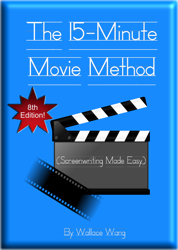Writers love to let their imaginations soar with grandiose ideas with starships exploring dozens of exotic planets, flying dragons circling medieval castles, or armies of thousands charging across a battlefield. Or writers might set their stories in the Victorian past complete with authentic costumes and vehicles.
Before you do that, stop and think. The more expensive your screenplay will be to make, the less likely it will ever be made. That’s because Hollywood is a business and spending millions of dollars on an unproven idea (intellectual property) will likely never happen. Hollywood always tries to play it safe by spending money on proven intellectual properties like books (“Divergent”), video games (“Borderlands”), TV shows (“CHIPS”), or remakes of older movies (“The Crow”).
Yet despite this reliance on existing intellectual property, all of these movies bombed in the box office anyway. That’s why the two easiest genres to write for are horror and comedy because both typically take place in the present and can be filmed anywhere. Even better, neither horror or comedy depend on A-list actors or directors.
So if you want to maximize your screenplay’s chances of success, keep your budget in mind. That means eliminating or minimizing anything that costs money. The purpose of this is twofold. First, nobody in Hollywood will blame you for keeping costs down. Second, and more importantly from a creative standpoint, cutting your budget can force you to get more creative and actually make better choices than if you could rely on spending a lot of money.
While filming “Rocky”, there was supposed to be a scene where Rocky and Adrian skate around an ice skating rink as they get to know each other. The scene called for a hundred or so extras to populate the scene, but then the director realized the cost for all these extras for a short scene wasn’t worth it. So the director simply eliminated all extras from the scene.
That forced the scene to focus solely on Rocky and Adrian in an empty skating rink all by themselves except for a surly worker who agrees to let them in for a price. Eliminating the extras made the scene focus more on Rocky and Adrian, cut costs, and revealed more about Rocky’s character as he bribes the worker to let Adrian skate for ten minutes in exchange for ten dollars.
If this scene had been shot exactly as filmed, it would have been cluttered with extras and Rocky wouldn’t have needed to bribe anyone. By cutting the extras, the scene became far more memorable while showing Rocky’s determination to make Adrian happy.
Another way to keep costs down is to eliminate unnecessary scenes. Every movie contains scenes that get filmed but ultimately cut. If you simply cut those scenes ahead of time, you’ll create a leaner, tighter story and without wasting money filming unnecessary scenes.
One key is to make sure every scene focuses on the hero or villain. We want to know what the hero will do but we also care what the villain will do because their actions will affect the hero. If a scene does not focus on the hero or villain, it’s a great candidate to get cut.
Look at the following deleted scene from “Good Will Hunting” where two secondary characters talk about the hero. There’s little conflict since the two characters get along, and there’s nothing involving the villain. The entire scene exists to talk about the hero who doesn’t even appear in the scene. Any surprise why it got cut?
Here’s another deleted scene from “Good Will Hunting” where nothing much happens. There’s little conflict so the scene feels flat and dull. Without conflict, there’s no story and since every scene must tell a story, a scene without conflict fails to hold our interest.
When writing your screenplay, always think how much stronger your story could be if you thought about a budget. Rod Serling developed “The Twilight Zone” TV series that was always running out of money. So he had to rewrite scenes and entire stories to cut characters, put them in settings that could be easily found on a studio, and minimized special effects to save money. When you watch “The Twilight Zone”, you never think about how the scene could have spent more money to make it bigger. You always think about how effective the scene is as if the writers had planned it that way from the beginning.
Always think of how to save money in your screenplay. Not only will this increase your screenplay’s chances of success, but it will help you create a much better story as a result.
Sign up to take a FREE course about how to write scenes in a screenplay.

